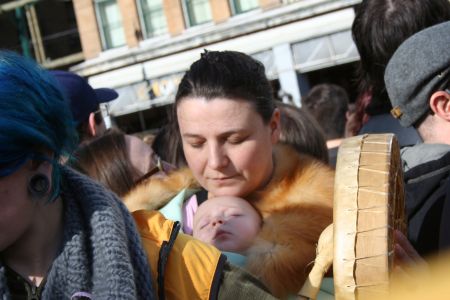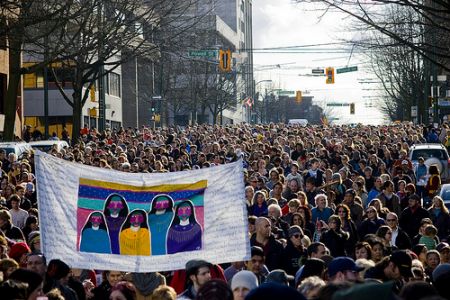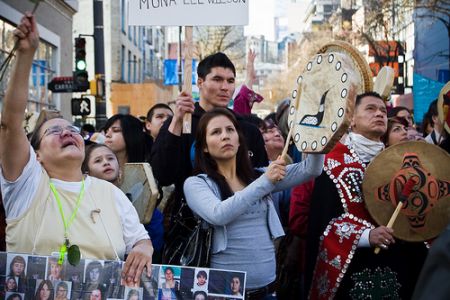STORY about Genderpublié le Février 15, 2010 by Moira Peters
This Is Where the Revolution Starts
19th Women's Memorial March honours 3,000 missing and murdered women

Families honoured their dead and disappeared relatives at the Women's Memorial March on February 14. // Amanda Zeider
Also posted by Moira Peters:
Also in Gender:
"This is where the injustice starts."
Dalannah Bowen addressed the 5,000 people gathered today in memory of Canada's 3,000 missing and murdered women. She was standing on the steps of the Vancouver Police Department station on Main Street in Vancouver's Downtown Eastside.
"This is where it starts for missing and murdered women," she said.
Bowen was followed to the mic by women who told stories of friends and relatives gone missing, or found dead, and of police inaction and disrespect.
"Each and every single person is part of this human family. We deserve to be treated like human beings," Bowen said.
Earlier in the morning at the Carnegie Centre, each and every person gathered for the beginning of the march witnessed a painful aspect of family: loss.
At 11:30 am, 400 people were gathered on the steps of Carnegie, on the corner and down the sidewalk on both sides of the building. Most were women. By 12:20, the crowd quadrupled and took up all four corners. Buses made it through the intersection with difficulty. By 1pm, the entire intersection was blocked, and "Carnegie hosts" in yellow vests linked hands, creating a corridor for the families of missing and murdered women to pass into the centre of the crowd. Most were women.
Drummers were invited into the centre. A cry rose. Hands pointed skyward. Pigeons flapped around the rooftops and seagulls circled. Higher, with unmistakeable white heads and majestic wingspans, two eagles soared.
A woman in a loose pink shirt and black hair stood on the steps of Carnegie, an eagle feather in her hand and a square of paper pressed to her breast. She raised the feather in the air and began a low wail. A song, a heartbreak. She concentrated on the sky, pleading with the sky, crying, her feather trembling.
The drums began. The crowd sang, for a half hour, while families filed out of the Carnegie patio and toward the centre of the intersection, carrying banners. Some were dressed in traditional regalia. Most were women.
The people marched.
"A nation is not conquered until the hearts of its women are on the ground. Then it's lost; it's down. No matter what. No matter how strong its warriors; no matter how powerful its weapons," said Mabel Nipshank. She located intent in violence against women as she spoke from the steps of the police station. The priority for Europeans in first contact with aboriginals, she said, was the disenfranchisement of women.
"They were afraid of the power of the First Nations women because when First Nations women spoke it echoed like thunder," she said.
Nipshank challenged two groups to collaborate in the demand for justice for killed and disappeared Indigenous women: First Nations leaders and white feminists.
"I don't have a whole lot of trust in our aboriginal leaders. They are pushing women off our territories and this" – she pointed to a placard with photos of hundreds of young women lost – "is what is happening to us. We need our leaders to challenge the colonial structures that have put us in poverty."
Nipshank called on feminists to quit talking the talk when they cannot walk the walk.
"Sometimes we don't fall into the white feminist ideology. [They] can't comprehend our oppression because [they] don't live it the way we do."
She asked the crowd to consider that the next case of a murdered or disappeared woman could be anyone's daughter, sister, aunt. "That is why we need to address this collectively. This is our problem as a whole people."
Sirens wailed.
Maggie de Vries told marchers about her sister Sarah who had been murdered at Robert Picton's pig farm.
"The investigation [into Sarah's disappearance and murder] did not have the full support of the province of British Columbia, of the Vancouver Police or of the RCMP. There was a resistance to admit there was anything wrong," she said.
"My sister was picked up, driven along a direct route: down Hastings Street to Boundary Road to the Lougheed Highway and onto Dominion Road. She was driven through a gate, and she never came out."
De Vries said in order to keep women safe the public needs an independent inquiry into the investigation of Vancouver's missing women.
Cee Jai Julien described the last time she saw her sister. It was December 14, 1998, and her sister was on her way to work. She asked her little sister Cee Jai to "go home, baby girl."
Ann-Marie August read a poem, which she wrote for her best friend who disappeared.
"My sister, my friend. Where are you? What happened to you?"
The drums beat, the people marched. The sun shone. It was Valentine's Day.
The site for the Vancouver local of The Media Co-op has been archived and will no longer be updated. Please visit the main Media Co-op website to learn more about the organization.


Commentaires
This is an amazing article
This is an amazing article about an inspiring event. I was there, and you highlighted everything that was especially moving and significant to me, particularly Delannah's comments about feminism. Great work! I am forwarding this to all my friends.
Na'vi
Our great mother Eywa does not take sides, only protects the balance of life.